
One of Voyagers’ Community School’s most refreshing aspects is how we embrace the outdoors. Unlike traditional schools, where outdoor time is often limited to a short recess or the occasional gym class, we see nature as an extension of our learning environment every day, in every season.
Growing up in a conventional school and later teaching in one, I saw how often outdoor play was sacrificed – canceled for rain, snow, or even just damp ground. At Voyagers, we take a different approach. Students arrive prepared with rain boots, snow pants, and warm layers, eager to dive into whatever the day brings. They run through the rain, jump into puddles, and mix up mud pies in our outdoor kitchen. When the first snowflakes fall, excitement fills the air as they sculpt snowmen and make angels in the fresh powder. Here, weather isn’t an obstacle; it’s an invitation. Teachers harness these moments, transforming them into hands-on learning experiences.
At Voyagers, the world is our classroom. We teach students that learning isn’t confined to four walls; it happens everywhere. Whether examining plants in the garden, tracking animal footprints in the snow, or observing cloud formations, children develop curiosity, creativity, and a deep appreciation for the natural world.
The Benefits of Outdoor Learning
Academic Growth
Spending time outside fosters curiosity and problem-solving skills. Nature-based exploration sharpens observation, encourages critical thinking, and nurtures a sense of wonder. Whether investigating the life cycle of a butterfly, mapping constellations, or measuring tree heights, students engage their senses and develop a deeper connection to their studies.
Physical Development
Outdoor play builds strength, coordination, and overall health. Running, climbing, balancing, and jumping develop motor skills, while exposure to changing weather enhances adaptability and resilience. Children who move freely in nature tend to be more physically confident and capable.
Emotional Well-Being
Fresh air and open spaces work wonders for mental health. Time in nature reduces stress, improves mood, and boosts energy. Whether it is the calming rustle of leaves, the feel of sun-warmed grass, or the rhythmic crunch of snow underfoot, outdoor time helps students reset, refocus, and return to their indoor activities more engaged and refreshed.
Social Development
The outdoors is a natural setting for teamwork, collaboration, and leadership. Group activities, whether building forts, solving outdoor challenges, or playing cooperative games, foster communication skills, empathy, and problem-solving. These interactions strengthen friendships and social confidence.
A Lifelong Impact
Outdoor play is an essential part of preschoolers’ development. Running, balancing, and climbing build coordination and resilience, while sensory experiences—mud between fingers, the scent of fresh rain, the crunch of fallen leaves—enhance cognitive growth. These moments lay the foundation for confidence, creativity, and a love of learning.
Older students also reap significant benefits. Regular time outside fosters independence, strengthens physical and mental health, and cultivates environmental awareness. By navigating different outdoor settings, they develop self-reliance and adaptability – skills that will serve them for life.
More Than Just Play
Outdoor learning is more than a break from the classroom —it’s essential to a well-rounded education. It nurtures curiosity, resilience, and a lifelong appreciation for the world around us. Whether splashing in puddles, building snow forts, or solving real-world problems inspired by nature, students at Voyagers gain experiences that shape not just their academic success but their growth as confident, capable individuals.
By embracing the outdoors, we prepare them for school and life.
Jennifer Brennan, Preschool/Elementary Teacher/Researcher